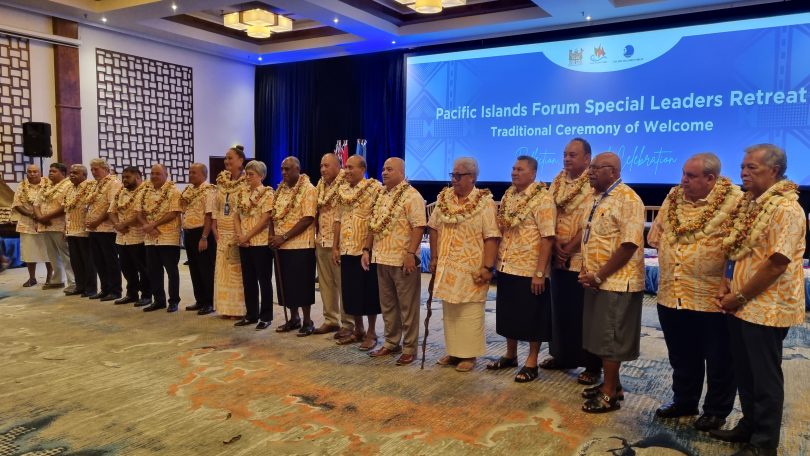By Sadhana Sen and Stephen Howes
In early 2021, the five Micronesian members of the Pacific Islands Forum (PIF) decided to withdraw from the Forum because, despite an understanding they thought they had that a Micronesian would be the next Forum Secretary-General (SG), their candidate was unsuccessful.
Efforts to avoid their departure have been underway since, and were concluded last week in the holiday resort of Denarau, Fiji, at a special leaders’ meeting, the fifth in the 52-year history of the Forum.
Most of what was agreed last week had already been detailed in last June’s confidential Suva Agreement. That agreement had been negotiated by Fiji’s former prime minister Frank Bainimarama and five other leaders (of the Federated States of Micronesia (FSM), Republic of the Marshall Islands (RMI), Palau, Cook Islands and Samoa). It included the following key points:
•a return to two Forum Deputy SGs, so that each of the three regions (Micronesia, Melanesia and Polynesia) at any one time would have one position: either SG or Deputy SG
•institutionalisation of the rotation of the SG and Forum Chair between the three subregions
•only one term for the current SG Henry Puna, and his replacement in 2024 by a Micronesian nominee
•creation of the role of Ocean Commissioner, until now combined with the position of SG, as a separate position, with an office in Micronesia, and the first Commissioner to be Micronesian
•a new subregional office to be established in Micronesia headed by a new subregional director
•a more representative Forum staff composition, presumably meaning more Micronesians on the Forum staff.
The Suva Agreement was a big win for Micronesia, but it had two problems. First, it wasn’t clear who would pay for it, and second, it didn’t provide enough to convince Kiribati to stay. Unlike the other Micronesian countries, Kiribati refused to rescind its threat of resignation and sign up to the Suva Agreement.
Hence last week’s special PIF leaders’ meeting. In preparation for it, Fiji’s new PM Sitiveni Rabuka visited Kiribati; and the Micronesian leaders met at the 21st Micronesian Presidents’ Summit (MPS), where they divided up the benefits that were to flow to them under the Suva Agreement as follows:
•Nauru – the next SG
•Kiribati – the Micronesian office
•Palau – the Ocean Commissioner office
•RMI – the first Ocean Commissioner.
FSM, the host of the MPS meeting, was compensated by the other four Micronesian countries for missing out on any of these Forum-related prizes by being made the host for a new permanent MPS secretariat.
Kiribati, now reassured that it would be getting something out of the Suva Agreement, finally rescinded its threat to leave the Forum, and joined the special leaders’ meeting. In turn, that meeting duly endorsed Micronesia’s decisions, announcing Nauru’s former president, Baron Waqa, a controversial figure, as the next PIF SG (starting in 2024) and Dr Filimon Manoni of RMI to the position of Pacific Ocean Commissioner (starting now).
While Micronesia was the main victor from this agreement, the other two regions – Melanesia and Polynesia – also walked away with something. Dr Manoni, the new Ocean Commissioner, is currently the Forum’s only Deputy SG, meaning that two Deputy positions will now need to be filled, one by a Polynesian and one by a Melanesian. And the special leaders’ meeting agreed to look into new Forum offices for Polynesia and Melanesia as well.
Cook Islands also needed to be compensated, as their former PM Henry Puna was only going to get one term as SG, whereas most SGs get two. It was initially announced in 2021 that Puna would be made Ocean Commissioner. However, this was presumably rejected by the Micronesians who wanted the position for themselves. Perhaps the fact that Cook Islands is to take over from Fiji as Forum Chair later this year helped seal the deal.
Importantly, the Denarau communique also solved the other problem of who would pay for this largesse by announcing that the usual suspects, Australia and New Zealand, would be footing the initial bill for the new offices and positions.
Some might see this as only fair, since it has long been believed that Australia and New Zealand voted against the Micronesian candidate in 2021. That candidate, Gerald Zackios, lost by only one vote, and if he had been elected all of this trouble would have been avoided. Unfortunately, the two countries have both consistently refused to be transparent about their voting records.
So, the deal has been done, and disintegration avoided. Where does this leave the Forum? Intact, which is all that matters to the aforementioned Australia and New Zealand. After all, this is a Pacific club that they belong to and China doesn’t.
However, the decisions are also damaging for the Forum, for two reasons.
First, the three subregional groupings have become more important, meaning that the Forum as a whole
has been weakened. Going forward, a greater emphasis on subregional equity and balance means (even) less emphasis on results achieved for the people of the region.
Second, the Pacific already has too many regional organisations and offices. Now it has another organisation (the Office of the Ocean Commissioner) and another three offices (one subregional office already agreed on, two more to follow). The 2022 Pacific leaders’ communique bemoaned the fact that regional “resource mobilisation is fragmented” and complained that “competing demands on financing remain key challenges”. The same leaders have now made that same situation worse.
No amount of talk about the Pacific Way and Vision 2050, and no number of reconciling hugs, can hide the cynical nature of the Denarau deal.
SOURCE: DEVPOLICY.ORG/PACNEWS















